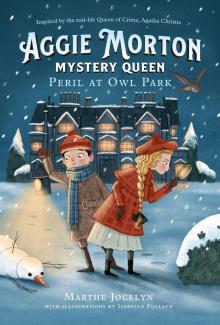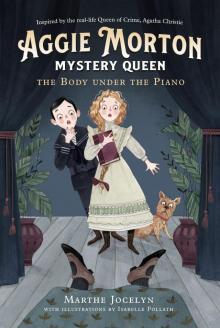- Home
- Marthe Jocelyn
How It Happened in Peach Hill Page 6
How It Happened in Peach Hill Read online
Page 6
Mama shook her head in disgust.
“—and I felt a terrible dizziness coming on and—”
“Miss Carruthers did report that you fainted,” admitted Mrs. Newman.
“You fainted?” Mama repeated.
“All the more reason that your absence this afternoon has been noted as willful truancy,” said Mrs. Newman. “The faint was clearly a ploy to excuse—”
“I didn’t realize that I’d fainted,” I said slowly. Inspired by my moments inside St. Alphonse Church, I felt a new idea swelling within me. “I can’t even tell you where I’ve been. I haven’t noticed anything outside myself.”
Oh, such an idea!
“Where my body has been is a mystery. But my soul has been transported!” Even Mama had never had an idea like this one. “I heard music, but it seemed I was enveloped in a dark shroud.”
“For four hours?” Mrs. Newman bit off her words as if they were a gingersnap.
“Mama!” I fell to my knees and buried my face in rose-colored chiffon. “Oh, Mama, I believe that I have been possessed by a spirit. She entered my mind and took control of my limbs. I seemed to be watching from a distant place as she took me on a remarkable journey.”
Mama shook her leg and pried me loose with her hands.
“Whatever are you babbling about?” All effort to be gentle and concerned had turned into irritation.
Mrs. Newman joined her. “This is the most ridiculous spewing of poppycock I have ever encountered! Get to your feet this instant, young lady!”
I tipped my head so that only Mama could see my face. I winked. The perfect partner, she rallied in an instant.
“Tell me again, Annie, dear,” she said. “Speak more slowly.”
“I received the spirit of a girl named Gwendalen,” I said. “I felt her slip into my body, as though I were a merino sweater. She told me she was born in 1214. Or, well, she didn’t exactly tell me, because she didn’t speak using words. She seemed to transfer her thoughts to me.…”
“Bosh!” said Mrs. Newman.
“She lives in a convent,” I continued. “She showed me scenes from her life, as though I were sitting at the moving pictures. Her father was very cruel and sent her away when he could not find her a husband. She said that if I provide her with ink and parchment she’ll communicate through me to write down her story.”
“What utter nonsense!” snorted Mrs. Newman. “I have never encountered such drivel! Your imagination borders on insane. Missus—Madame—how can you put up with this?”
“It is not unheard of, Mrs. Newman,” said Mama quietly, “when there has been a cataclysmic occurrence such as the healing of my daughter, that other magnetic forces come into play. She could easily be a conduit! The living, breathing conduit for a spirit who is trapped between worlds.” Mama’s voice rose with excitement. “If this is the case, we can all rejoice! If Annie has been selected as a vessel of spiritual power, it is something to celebrate!
“Peg! Peg!” Mama began to shout.
Mrs. Newman’s mouth dropped open in a gape of disbelief. “Both of you,” she muttered. “Like mother, like daughter.” She stepped away from us, her hands up as if to fend off an attack.
“Yes’m?” Peg appeared from the kitchen, drying her hands on a tea towel.
“Please find paper and a fountain pen in the drawer of my writing desk and bring them to the front room.”
“Yes’m.”
“You’re going to indulge your disobedient and truant daughter in this way?”
“Gwendalen said parchment, Mama.”
“This is absurd,” said Mrs. Newman.
“She likely didn’t have paper, darling heart,” said Mama. “In the twelve hundreds, did you say?”
There came a knock at the door.
“Oh!” cried Mama. “The callers are here already. Peg! Never mind the paper! Peg! Answer the door!”
“I’ll get it, Mama.” I stepped around Mrs. Newman and opened the door. Two young women were there, both wearing wool jackets with thick raccoon collars turned up. The sky had turned gray since I’d come in, and a blustery wind was blowing. Behind the ladies was Mr. Poole, smirking like a well-fed Persian cat. I glanced at Mama. Did she think he was handsome?
“Hello, Annie.”
“Come in,” I said. Peg bustled up to help with the coats.
“This is the miracle child,” Mr. Poole told his companions. “Observing her now, it’s hard to remember that she was no better than a drooling moron last week.”
If only I could arch my eyebrow like Mrs. Newman’s!
“I hope I have not offended you, my dear. It was none of your own doing. And now, you see? Here you are, greeting us like a perfect little hostess.”
“We’ve had the most thrilling thing happen,” gushed Mama. “Just this afternoon, it seems that my Annie has had the honor of becoming a vessel for a spirit caller.”
She was greeted with a trio of blank faces.
“There are rare occasions,” Mama said, trying to explain the unexplainable, “when a restless spirit seizes the chance to inhabit a living person and gives voice to centuries of wisdom and poetry—”
“Well, well,” said Mr. Poole. “Another marvel.”
“Please, step in,” I said.
“This is my wife’s niece, Claudia Weather,” said Mr. Poole, putting his hand on the shoulder of the taller girl. Taller because her shoes had higher heels. She also wore too much rouge, like buttons painted on her cheeks. “Noisy,” my mother would say.
“Good evening, Miss Weather.” I bobbed a curtsey and backed up, trying to make room in the crowded hallway.
“This is Claudia’s good friend, Sylvia Torn, who lost her husband in the Great War. She’s visiting from Springfield.”
“Oh, dear,” I said. “That’s the saddest thing I ever heard.” We naturally had no file on someone from another town. Mama widened her eyes at me in a silent command; I had two minutes to extract something useful from her. “What a pretty ring,” I gushed. “Were you newlyweds?”
“We were married four months and nine days before he went overseas. In New Orleans. That’s where we were from.”
“I’m so sorry.”
“But I couldn’t bear to go back there after he died, so I’m trying out a new place. I just …” She shrugged. “I keep expecting to wake up and still be Buddy’s girl. I just can’t seem to get on with things.”
Mrs. Newman would not budge an inch the whole time Peg was taking the coats. It got to be awkward with her just standing there. I’d have to introduce her.
“This is Mrs. Newman,” I said. “Mr. Poole, Miss Weather, Mrs. Torn.”
“Will you be joining us for the calling, Mrs. Newman?” asked Mr. Poole.
“No,” I said.
“No,” said Mama.
“I don’t think—” said Mrs. Newman.
“Oh, please stay,” said Mr. Poole. “We would be delighted to extend the circle. If you haven’t seen Madame Caterina before, you must join us.” He was such a gentleman that she would have seemed downright rude to say no. “It’s sure to be a remarkable experience.”
Mrs. Newman smiled a half-smile and allowed Peg to take her coat too; her thin woolen coat without a trace of fur, not even rabbit, on the collar.
10
If you use the same pencil to
write a test that you used to
study for the test, the pencil
will remember the answers.
“Have you been to a séance before?” I asked as Mama ushered everyone into the front room. The young ladies shook their heads.
“We never know who will be waiting on the Other Side to greet my mother,” I explained. “She sends the message through and hopes to reach the callers’ departed loved ones, but the connection is fragile and occasionally broken.” I had to tell them this in case there was a perilous moment or an awkward question and Mama had to end the séance abruptly.
“How did you first know you had the second sig
ht, Madame?” Miss Weather asked.
“Oh, even as a child,” said Mama, “I heard voices and saw what I now know were visions. I was eleven or twelve before I discovered that not everyone was able to see beyond the place and time where their earthbound bodies dwelt. My cousin, Timothy, died of diphtheria, but he still spent his evenings in my room, playing Hide the Button and begging for ghost stories.” She always gave a melancholy laugh at this point in the recollection. “Poor little mite didn’t know he was a ghost.”
I wouldn’t want to read the book where Mama found that muck, but it often inspired wet eyes. Mr. Poole’s niece and her friend were likely softies. Mrs. Newman, however, looked as tough as a cowboy’s backside.
I lit the candles, set in sconces on the walls and in crystal saucers on the windowsill. The only electric illumination was a standing lamp, which Mama kept draped with a pink scarf so it cast a glow of sunset in one corner. Most mediums preferred to perform in complete darkness, but to us that screamed of tricks. Mama said “Seeing is believing,” so we kept the lights turned on, a little.
The seating arrangement was a delicate matter. Mama had her chair and I had mine, already rigged as needed. But it had to seem to the customers that I simply slid into the last empty seat. Once everyone was sitting down, I slipped off my shoes and looped the transparent fishing line around my ankle as I pretended to scrape my chair into position. That was the official opening of our routine. Mama admonished me, as she always did: “Annie, you’ll scare off the spirits. Be careful, dear heart!”
One of the ladies giggled, Miss Weather, I think. A nervous laugh is common at the beginning of a calling. We try to have them crying by the end. I was nervous that day, with Mrs. Newman sitting there looking downright leery.
“We must warm the connection,” Mama began. “Please place your hands on the table.…” All hands were obediently laid on the gleaming walnut surface. We gave a minute to let people settle, to sit quietly in the flickering light, to wonder what would happen next.
Mrs. Torn sat beside me with her fingers spread wide, showing off ragged nails. She must chew them like toast. Mrs. Newman seemed to be gripping the table, the sinews taut on her long fingers. Mama’s hands were elegant, with beautifully shaped nails. The tips of her fingers drummed gently on the wood; she was impatient to get started. Miss Weather, across the table, had pulled off her gloves as we sat down, revealing a wart near the tip of her ring finger. Mr. Poole sat next to his niece. His hands were large, with a light crop of dark hair below each knuckle. How could Mama consider marrying him? He had hairy fingers! He sat bolt upright, perhaps more excited than anyone else.
“Take the hands of your neighbors to form a circle,” said Mama. Mama did a lovely séance, I must say. The candles were placed just so, to keep a golden gleam on her face, highlighting her cheekbones and catching auburn flecks in her dark hair.
“Let us hum together,” she said. “It will improve our chances of entry into the spirit world.”
Most people were self-conscious and needed to be shown. Mama began, as always leading the way. Of course I joined right in with her, my hum soft and steady, on a higher note than hers. Mr. Poole started up, deep and rolling. He likely sang bass in the church choir. Miss Weather and Mrs. Torn were a bit meek with their contribution, and Mrs. Newman made no sound at all. Her eyes stayed intently on Mama, which was certainly best for me. The candles wavered, not by my doing but just because of air currents. The flicker made the two young women gasp and Mrs. Newman roll her eyes.
It worked best to keep the hum going strong until people stopped twitching, until they were nearly bored. Mama’s voice got subtly higher and began to falter, as if she were deciding which note to continue. Her eyes closed halfway. That was my signal.
Crack! Ladies always jumped at the sharp snap below us, or was it coming from the corner of the room? Squeals were stifled. Another crack! Mrs. Newman leaned over slowly to look under the table. There was nothing for her to see except legs and boots and my stockinged feet, playing with my shoes. I waited until she was upright and then crack! I knew she was puzzled, but she held her face blank. Mama jerked abruptly, as if she had collided with some force invisible to the rest of us. She recovered quickly but remained slumped and began to speak in a husky voice, completely unlike her own.
“I am standing at the Gate to Beyond,” she said. “There is quite a crowd to greet us here today. There is a fellow in uniform, wanting to speak to Sylvia Torn.”
Mrs. Torn shrieked. She dropped my hand and Mrs. Newman’s. Her fingers flew to her mouth.
“He’s waiting, Sylvia Torn. Are you ready to hear him?”
“Yes!” she bleated. “Yes, I am!”
I waggled my foot, tugging the fishing line to make the pink kerchief hanging over the lamp flutter wildly for a moment. Rosy shafts of light flew across the ceiling, and the candle flames danced. Mama’s voice altered pitch and took on a faint Southern twang.
“Sylvie?” she said, guessing.
Mrs. Torn nodded urgently and moved her hands from her lips long enough to whisper, “Buddy?”
“Who else?”
“Buddy!”
“How’s my girl?”
“Oh, Buddy! I miss you!”
“Don’t you worry about me anymore. I’m doing just fine over here. But it’s time for you to buck up, my girl. Time to move on.”
“Oh, Buddy! I can’t live without you!”
“Sure you can! You’re my girl, aren’t you? Tell you what I think. You need a job,” said Buddy.
Mrs. Newman made a sound, but Mama kept going.
“In a shop, maybe, or a café? Get out and meet some new people, maybe even a fella, eh, Sylvie? You’re too pretty to mope about all day, biting your fingernails!”
“What?” Mrs. Torn curled her fingertips into fists.
“I love you, Sylvie.” Very faint.
I cracked my toe joint again quickly, hoping to limit the sobs.
“Buddy’s gone,” said Mama’s husky voice. “Handsome fellow, wants the best for you.”
“Yes,” breathed Mrs. Torn.
“But there’s someone else here who won’t wait a moment longer. She insists on speaking to Gregory Poole.”
“Christine?” said Mr. Poole.
“Gregory? Gregory? Is that you?” Mama’s voice was high and querulous, the same one she’d used in his fancy dining room.
“It has been a quiet week,” said Mr. Poole. “Thank you, Christine.”
I had a sudden vision of her bracelet nestled on velvet in Laraby’s window. I hadn’t told Mama, but now I looked at Mr. Poole more closely. Was he really thanking her for her jewelry?
“I’ve been resting,” said Mrs. Poole. “Watching you. I’m trying to decide what I think of your new friend.”
“Oh, well, ah …” Mr. Poole was embarrassed and confused. His wife was speaking through the mouth of the very friend she was being rude to!
“And I’ve noticed that you haven’t been to visit my grave, Gregory.” Mr. Poole squirmed as Miss Weather looked up sharply. Good guess, Mama! “It could use some attention. What will people say?”
“Ah, well, you’re right, Christine. I’ll order fresh flowers tomorrow.”
“No woman alive will feel affection for a man who doesn’t honor his deceased wife.”
“Ah, thank you, Christine. Is there anything you’d like to say about the business?”
“Watch carefully for signs, Gregory,” said Mrs. Poole. “You haven’t heard the last from me.”
Mama loved to tack that on with wealthy clients. Even if they loathed their dear departed, they could never resist hearing more as promised. Mama started to hum, ever so quietly, so I knew to crack my toe again.
Suddenly there came a thud, and it wasn’t me this time. I was the only one who jumped, because the others didn’t know we were at the end, didn’t realize we were waiting for Mama’s “fall” out of trance.
Instead we heard her husky voice again. “There�
��s quite a vision here now. She’s an ancient soul indeed and seems to be wearing—is it called a wimple? She’s here for Annie.”
“Wha—?” One syllable escaped before I gathered my wits. I settled my hands back to the table. All eyes were on me.
“This is Annie,” I called out.
There was silence, then a thump.
“She cannot speak,” said Mama. “She wants parchment and ink.”
“Parchment?” said Mr. Poole.
I looked around wildly. Peg had been distracted by the guests’ arrival and had not brought the paper. We couldn’t call her in the middle of a séance!
Mrs. Newman removed her hands from the circle and groped beneath her seat. She dragged her bag onto her lap and pulled out a notebook, which she laid flat on the table. She riffled through it, past columns and lists to a blank page toward the back. Mama was back to humming all the while. Mrs. Newman produced a sharpened pencil and placed it in the center of the book.
“There,” she said. “The parchment of 1924.”
Mama’s eyes stayed half lowered, and she kept humming for a bit before speaking. “She wants Annie to hold the writing implement.”
“Tell her it’s called a pencil,” said Mrs. Newman, sounding peevish. The notebook was passed to me and I picked up the pencil, awaiting inspiration.
I took a breath and threw my head back and then forward as if someone were throttling me. I shuddered a tremendous shudder and began to write.
My name is Gwendalen of Stone House, I scrawled. I am daughter to Arne the Vast and Elbecca of Tune.
“What’s she writing?” whispered Miss Weather. “What does it say?”
“I can’t quite see,” said Mrs. Torn.
“Well, lean over! Read it aloud!”
I kept going.
My oldest brother, Horehound, has gone to be trained for the wars. The next brother, Matts, is gone to a monastery. I reached the age of fourteen and could not be married easily as I am homely and tall. I angered my father in many ways. I was sent away from my home, nine days’ journey with a mule, to join the convent at Craighn, the order of Saint Lucy, patroness of blind people and writers.…

 Peril at Owl Park
Peril at Owl Park The Body under the Piano
The Body under the Piano Mable Riley
Mable Riley Earthly Astonishments
Earthly Astonishments How It Happened in Peach Hill
How It Happened in Peach Hill The Invisible Day
The Invisible Day The Invisible Harry
The Invisible Harry A Big Dose of Lucky
A Big Dose of Lucky What We Hide
What We Hide Would You
Would You Secrets
Secrets First Times
First Times The Invisible Enemy
The Invisible Enemy Folly
Folly